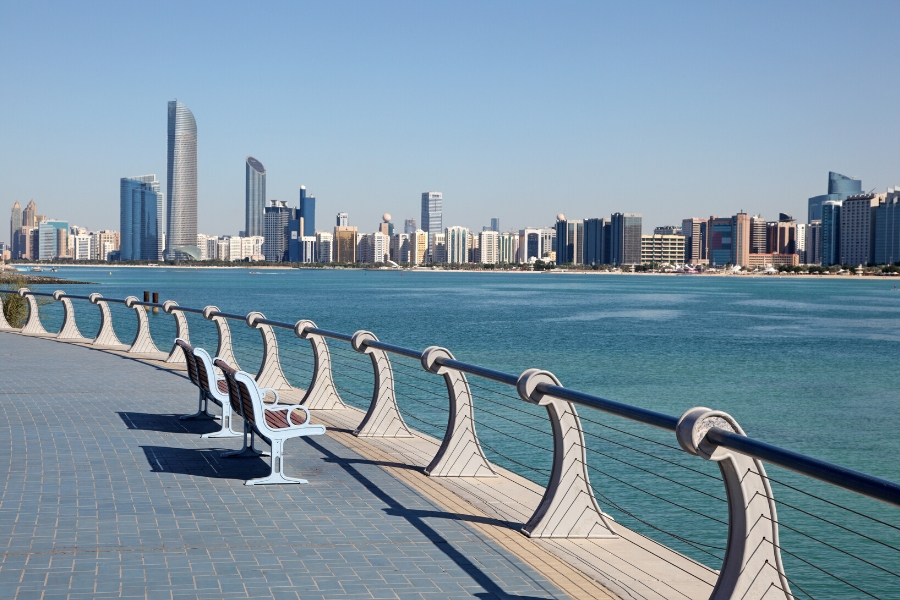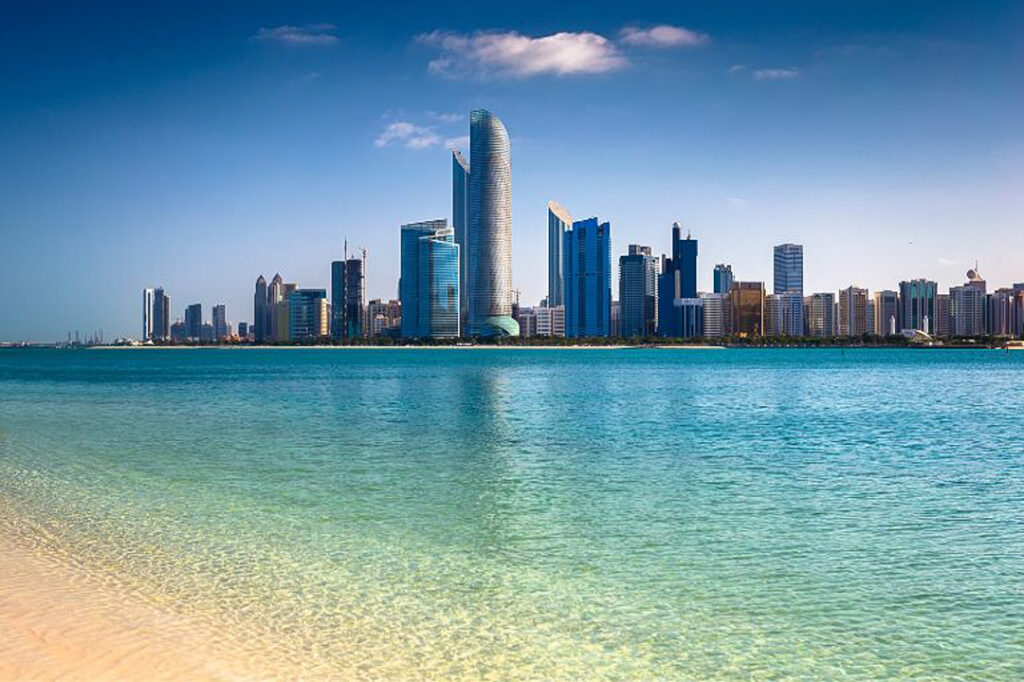Weather in Abu Dhabi is one of the defining features of this vibrant city. As the capital of the United Arab Emirates, Abu Dhabi experiences a hot desert climate that shapes daily life, tourism, and even business activities. Understanding the city’s weather patterns is essential for residents and visitors alike, whether planning outdoor activities, sightseeing, or business meetings.
Abu Dhabi’s climate is characterized by high temperatures, especially in summer, mild winters, and very little rainfall. The city enjoys clear skies for the majority of the year, offering endless sunshine and creating a unique environment that defines the lifestyle in the UAE.
Understanding Abu Dhabi’s Climate
Abu Dhabi falls within the hot desert climate zone. This means the city experiences extreme temperatures in summer, with heat that can feel intense due to high humidity levels. Winters, on the other hand, are mild and very pleasant, offering a much-needed break from the scorching summer months.

Some key features of Abu Dhabi’s climate include:
- High Summer Temperatures: Daytime temperatures often exceed 40°C (104°F) in the peak months of July and August. The heat can feel more intense during humid days near the coast.
- Mild Winters: From December to February, the temperature ranges from 17°C (63°F) at night to 27°C (81°F) during the day. This period is considered the most comfortable for outdoor activities.
- Low Rainfall: Abu Dhabi receives minimal rainfall, with precipitation mostly occurring in the winter months. The city’s arid climate means rain is infrequent but can sometimes result in sudden showers.
- High Sunshine Hours: Abu Dhabi enjoys long hours of sunlight throughout the year, providing a bright and lively atmosphere that attracts visitors from around the world.
Seasonal Weather Patterns
Spring (March to May)
Spring in Abu Dhabi marks the transition from the cooler winter months to the hotter summer period. Daytime temperatures gradually rise from around 31°C (88°F) in March to 40°C (104°F) in May. Nights remain warm, providing a comfortable climate compared to the summer heat.

Spring is an ideal time for outdoor activities such as walking along the Corniche, visiting parks, or exploring desert safaris. The skies are clear, and the weather is dry, making it one of the more enjoyable seasons to experience the city.
Summer (June to September)
Summer in Abu Dhabi is intense. Temperatures often exceed 40°C (104°F) during the day, with July and August being the hottest months. The combination of high temperatures and humidity can make it feel even hotter, often requiring air conditioning indoors and precautions for those venturing outside.
Outdoor activities during summer are best scheduled early in the morning or after sunset to avoid peak heat. The beaches remain popular as residents and tourists seek relief in swimming pools or the cooler waters of the Arabian Gulf.
Despite the heat, summer is an important season for tourism in indoor venues, shopping malls, and entertainment centers that provide air-conditioned comfort.
Autumn (October to November)
Autumn brings a gradual reduction in temperatures, making it more comfortable for outdoor activities. Daytime highs range from 37°C (99°F) in October to 31°C (88°F) in November, while nights cool down to around 21–25°C (70–77°F).
This season is suitable for desert safaris, outdoor dining, and cultural sightseeing. The weather is warm but not overpowering, allowing tourists to explore the city’s landmarks, heritage sites, and natural beauty without the discomfort of extreme summer heat.

Winter (December to February)
Winter is the most pleasant season in Abu Dhabi. With daytime temperatures averaging 25–27°C (77–81°F) and nighttime lows around 17°C (63°F), the weather is ideal for spending time outdoors.
This is also the peak tourist season, as the city offers the perfect climate for sightseeing, shopping, and attending outdoor events and festivals. Visitors often enjoy activities such as walking along the Corniche, visiting Abu Dhabi’s famous mosques, or taking boat trips to nearby islands.
Monthly Weather Overview
A closer look at the monthly weather in Abu Dhabi helps understand the seasonal variations:
- January: Cool and comfortable, with daytime highs of 25°C and nights around 15°C.
- February: Slightly warmer than January, daytime temperatures around 26°C.
- March: Transition month with highs reaching 30°C and pleasant evenings.
- April: Warm days around 35°C and dry conditions.
- May: Hotter days approaching 40°C, signaling the start of summer.
- June: Summer heat intensifies, daytime highs around 41°C.
- July: Peak summer, temperatures reach 44°C, high humidity.
- August: Extremely hot with highs around 43°C and nights around 32°C.
- September: Gradual decrease in temperatures, daytime highs around 41°C.
- October: Cooler autumn weather, highs around 37°C.
- November: Mild days around 31°C, nights around 21°C.
- December: Comfortable winter temperatures, highs around 27°C, lows 17°C.
Extreme Weather Conditions
While Abu Dhabi is generally sunny and dry, extreme weather conditions occasionally occur. Heatwaves can cause temperatures to rise above 45°C (113°F), and residents are advised to take precautions such as staying hydrated, avoiding outdoor activities during peak heat, and using sun protection.
Heavy rain is rare but can occur during the winter months. Flash floods may happen due to sudden rainstorms, affecting roads and low-lying areas. Dust storms are another weather phenomenon that can temporarily reduce visibility and impact daily life.
Best Time to Visit Abu Dhabi
The ideal time to visit Abu Dhabi is during the winter and early spring months, from November to March. During this period, temperatures are comfortable, skies are clear, and outdoor activities are most enjoyable.
Visitors planning trips during this time can explore Abu Dhabi’s beaches, cultural landmarks, and desert landscapes without the challenges of extreme heat. Winter is also when festivals, outdoor markets, and cultural events are most active.

Practical Travel Tips for Dealing with Abu Dhabi’s Weather
- Stay Hydrated: With high temperatures, especially in summer, drinking water frequently is essential.
- Dress Appropriately: Light, breathable clothing is recommended, while modest attire is expected in public places.
- Use Sun Protection: Sunscreen, sunglasses, and hats help prevent sunburn during the long hours of sunlight.
- Plan Outdoor Activities Wisely: Schedule outdoor excursions for early mornings or evenings in the summer to avoid peak heat.
- Seek Indoor Entertainment During Summer: Shopping malls, museums, and indoor attractions provide comfortable alternatives to outdoor activities.
- Monitor Weather Alerts: Be aware of heatwaves or unexpected rain, especially during winter months, to ensure safety during travels.
Weather and Lifestyle in Abu Dhabi
The weather in Abu Dhabi significantly influences daily life. Residents adapt by balancing outdoor activities with indoor comfort, making use of air conditioning, shaded areas, and water sports to cope with the heat. The city’s architecture, urban planning, and infrastructure also reflect the need for cooling and shade, with wide use of shaded walkways, gardens, and climate-controlled public spaces.
Tourism in Abu Dhabi is also shaped by the weather. Winter attracts tourists from Europe and other colder regions, while summer sees a focus on indoor entertainment and luxury hotels offering pools and beach access. Festivals and cultural events are often scheduled around milder months to ensure a comfortable experience for attendees.
Conclusion
The weather in Abu Dhabi is a defining aspect of the city’s identity. Its hot desert climate, with scorching summers and mild winters, impacts everything from daily life to tourism and business. Understanding the seasonal variations and planning accordingly ensures a safe and enjoyable experience in the UAE’s capital.
Whether you are visiting during the cooler months or navigating the summer heat, Abu Dhabi offers unique experiences shaped by its distinctive climate. With proper planning, hydration, and sun protection, residents and visitors alike can enjoy the city’s vibrant culture, stunning architecture, and scenic landscapes throughout the year.
Do follow UAE Stories on Instagram
Read Next – Explore The Springs Souk Dubai: Shopping, Dining & Fun














